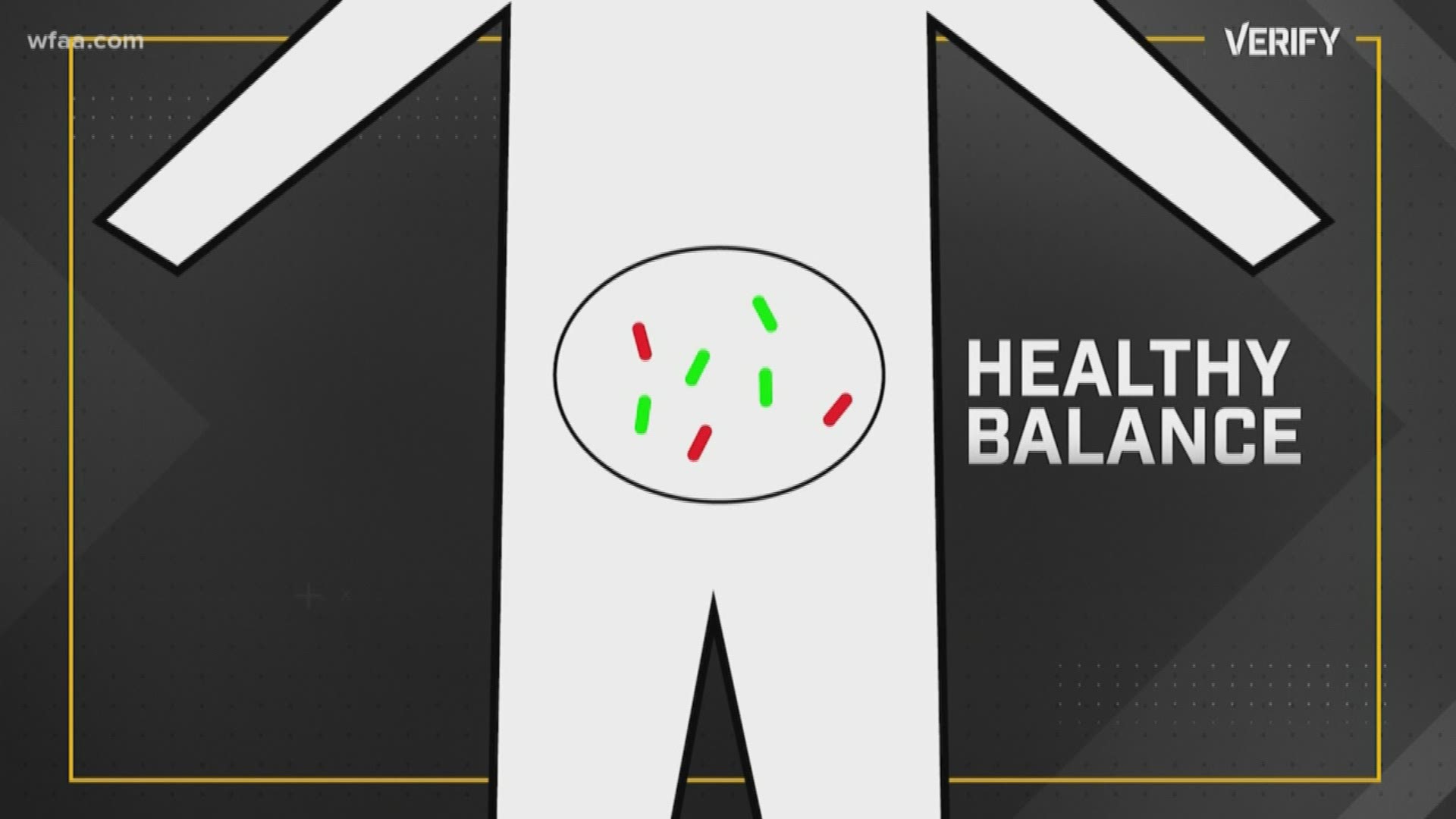For the last year, I've been into probiotics. They're in lots of foods and supplements. I think they make me feel better. And obviously, lots of you do too because probiotics are a $37-billion business.
I want to verify this: Do probiotics help us maintain our overall health?
HEALTH CLAIMS
What are probiotics? The world is full of living bacteria. Some are bad. Some of the good ones are called probiotics. And when you consume them they can promote a healthy balance of bacteria in your belly.
Researchers around the world are exploring the potential of probiotics to eventually help with chronic illnesses like auto-immune conditions and obesity.
In his work, Dr. Andy Koh at UT-Southwestern’s Simmons Cancer Center explores the potential of probiotics to eventually treat cancer.
But today, research has shown probiotics can treat illnesses like diarrhea, constipation, eczema and ear infections.
“But the devil is in the details,” Dr. Koh tells me.
“If the probiotic doesn't have the right amount of bugs, or they don't get (make it past stomach acids) or they don't change anything in there, they're not going to have an effect. So, we really need to figure out what's the right combination, and which one’s work to give you the benefit,” he says.
Because of a lack of science, Koh's not wild about how probiotics are sold to us as having long-term health benefits. Many popular supplements make a range of statements that probiotics help with digestion, immunity, weight management and sleep.
But on the back of many of boxes, you’ll find a disclaimer that reads: This product is not intended to diagnose, treat, cure or prevent any disease.
“You’re skeptical that there's evidence these work?” I ask.
“The current over-the-counter probiotics,” Koh adds.
What he's saying is probiotics have promise but the science just isn't there yet.
YOGURT
Yogurt is one food widely-associated with probiotics. Garvi Patel is a food scientist at Lucky Layla Farms. She's showing me how their milk is fermented into yogurt using a handful of probiotic bacteria.
“This little pouch we can treat over 260 gallons of milk,” Garvi says.
During my visit, she puts the bacteria in a vat of milk. In a few hours, it will all be fermented.
“It's kind of amazing that tiny, little packet of probiotics, will make hundreds of gallons of yogurt. It's just milk right now and (the probiotic) makes the yogurt. Who knew?” I say after observing.
Lucky Layla does not make health claims about its yogurt. But Activia does. It says eating it twice a day for two weeks "may help reduce the frequency of minor digestive discomfort."
Dannon, the maker of Activia, bases its claim on clinical trials published in the British Journal of Nutrition.
I spoke with their chief scientist, Dr. Michael Freitas.
“I was sort of surprised when I read the claim about Activia as to how narrow it was,” I say.
“The words like ‘may’, or ‘help’ or ‘support’, I think they are very important to be used for consumers to understand this is not a magic bullet. We're not talking about drugs, we're talking about foods,” Freitas says.
So, yogurt may be generally healthy. But when it comes to long-term health we may be giving it more credit then it’s actually taking.
PROBIOTIC FOOD AT HOME
Probiotics don't just come from the grocery store or a bottle. You can make them at home.
“I had no idea this happened when you squeeze cabbage,” I’m saying, while learning how to ferment cabbage into sauerkraut, which is rich in probiotics.
Alex Lewin is my teacher. He’s the author of a new fermentation cookbook called Kombucha, Kefir, and Beyond.
“I think you're likely to find what you need in here,” Alex says about the sauerkraut we’re making.
Jack Gilbert is a leading probiotic researcher at the University of Chicago and the author of Dirt is Good.
“I eat sauerkraut because I like the taste. Is it having a beneficial impact on my health? Quite possibly? But I have no evidence of that,” he says.
Gilbert is telling me that we know probiotics can make someone better when they're feeling sick from things like diarrhea but...
“What we do not have a handle on is whether they can maintain health. And there's no evidence that we can,” he says. “Moving forward should you continually consume them if you're already healthy?” Gilbert says and then shrugs his head no.
Back in the kitchen with Alex Lewin, I have one more question.
“Okay, we've heard all that then why should we be eating it if we don't know 100% whether it's awesome?” I ask.
“You can wait 30 years and then learn, ‘oh yeah, if I'd been eating sauerkraut for the last 30 years I'd be much healthier than I am’. It won't hurt,” he says.
CONCLUSION
So, what have we verified?
There are claims, backed by science, that probiotics can treat some illness. But do probiotics help us maintain our overall health? The answer, is no. So far, there's no proof.
Got something you want verified, send me an email: david@verifytv.com

